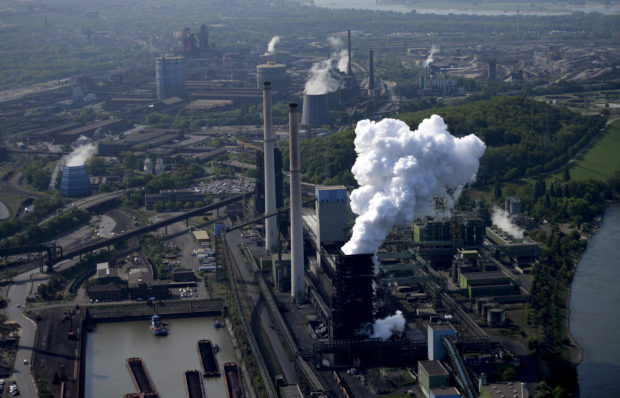Pandemic caused ‘unprecedented’ emissions drop — study

The coking plant of German industrial conglomerate ThyssenKrupp on May 8, 2020. Image: AFP/Ina Fassbender
Pandemic restrictions saw an unprecedented fall in greenhouse gas emissions in the first half of 2020 — larger than during the 2008 financial crisis and even World War II — experts said Wednesday.
As governments ordered lockdowns to try to crush the first wave of COVID-19, carbon dioxide (CO2) emissions from transport, power and aviation plummeted, the international team of researchers said.
Using data including hourly electricity production, vehicle traffic from more than 400 cities worldwide, daily passenger flights and monthly production and consumption figures, they determined that the year-on-year emissions drop of 8.8% was the largest in modern history.
They suggested some fundamental steps that could be taken to “stabilize the global climate” as countries look to recover from the economic shock of the pandemic.
They noted however that emissions had rebounded to their usual levels by July 2020, when most nations had eased lockdown measures.
Zhu Liu from the Department of Earth System Science at Tsinghua University in Beijing said the study was the most accurate yet undertaken on the pandemic’s effect on emissions.
“We were able to get a much faster and more accurate overview, including timelines that show how emissions decreases have corresponded to lockdown measures in each country,” said Zhu, lead author of the study published in Nature Communications.
The team found that CO2 emissions from transport decreased by 40% in the first half of 2020, and power production and industry emissions fell 22% and 17% respectively.
With more people working from home, the study showed a perhaps surprising 3% fall in residential emissions — something researchers attributed to an abnormally warm winter leading to lower heating consumption.
In April, when restrictions on movement and workplaces were at their height, total emissions dropped a whopping 16.9% compared with the same month in 2019.
“Overall, the various outbreaks resulted in emissions drops that we only see on a short-term basis on holidays such as Christmas or the Chinese Spring Festival,” said Zhu.
‘Complete overhaul’ needed
An international plan to limit global warming outlined in the 2015 Paris climate deal aims to cap temperature rises well below 2 degrees Celsius compared with pre-industrial levels.
The accord envisages a safer limit of 1.5 degrees of warming — something the United Nations says would take an annual 7.7% reduction in emissions this decade to achieve.
The authors of Wednesday’s study agreed with the writers of similar research released in August claiming that the 2020 emissions dip was unlikely to ease the climate emergency in the long term.
They said nothing less than a “complete overhaul” of the industry and commerce would keep a handle on global warming.
“While the CO2 drop is unprecedented, decreases of human activities cannot be the answer,” said Wednesday’s co-author Hans Joachim Schellnhuber, founding director of the Potsdam Institute for Climate Impact Research.
“We need structural and transformational changes in our energy production and consumption systems.” RGA
RELATED STORIES:
In the Netherlands, cycling benefits the environment and life expectancy
For more news about the novel coronavirus click here.
What you need to know about Coronavirus.
For more information on COVID-19, call the DOH Hotline: (02) 86517800 local 1149/1150.
The Inquirer Foundation supports our healthcare frontliners and is still accepting cash donations to be deposited at Banco de Oro (BDO) current account #007960018860 or donate through PayMaya using this link.